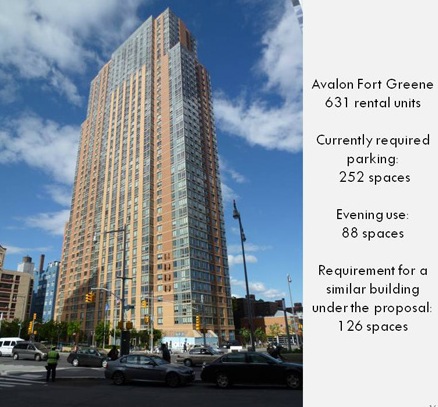Downtown Brooklyn's mandatory parking minimums would be cut in half for new development and eliminated outright for affordable housing under a plan from the Department of City Planning. The change is significant -- the first rollback of the costly and car-ownership inducing requirements under the Bloomberg administration -- but doesn't go far enough. Even by DCP's own roundabout admission, the reduced parking minimums will still create an unnecessarily large supply of parking.
Currently, zoning for the city's third-largest business district requires a 40 percent parking ratio for market-rate housing units (i.e. four parking spots for every 10 apartments) and 25 percent for affordable housing. The DCP plan would drop the market-rate ratio to 20 percent and eliminate the requirement for affordable housing. There are currently no parking minimums in the area for commercial buildings and no parking minimums on any development along a designated stretch of Atlantic Avenue.
"Our goal is to rationalize parking requirements for Downtown Brooklyn, recognizing that it has some of the best transit infrastructure and one of lowest rates of auto ownership in New York City," said DCP Director Amanda Burden. "Our new Downtown Brooklyn Off-Street Parking rules will better allocate parking where it is needed while removing the financial burden of having to provide parking for affordable housing."
The reforms are badly needed in Downtown Brooklyn, which DCP senior planner Lish Whitson noted boasts "some of the best transit infrastructure in the country." Residential developments simply don't use the amount of parking they are being required to build. Existing garages in the area are only half full on the weekend and 40 percent filled during the evenings, according to data provided by the Downtown Brooklyn Partnership.
"There's an oversupply right now," Burden said.
In his presentation to the planning commission, Whitson singled out one building to illustrate how the new rules would work. The Avalon Fort Greene has 631 rental units and was required by law to provide 252 new parking spaces along with them. During the evenings, DCP found, only 88 of those spaces are filled. Each parking space in the area costs $50,000 to build, Whitson said. When the spaces sit empty, or when garages have to drop their prices to attract customers, he noted, "those costs are passed on to the residents of the buildings, most of whom don't own cars."
But at 20 percent, the proposed parking minimums are still too high for the area. At the Avalon, Whitson admitted that the new minimums would have required 126 spaces to be built, a number that is still 50 percent higher than what the building currently rents out.
Why, then, mandate such a high number? More than one planning commissioner wondered the same thing.
"Why not eliminate the residential requirement altogether and let the market figure out how many spaces are the right number?" asked commissioner Anna Levin.
The answer was pure politics. "There was concern in the community that parking be continued to be provided for future residents," responded Whitson.
It is not clear who in the community is advocating for the retention of parking minimums. Community Board 2 has not yet weighed in on the proposal, District Manager Robert Perris told Streetsblog; the board will hold its first hearing on the changes on June 20. The Department of City Planning has not yet responded to a Streetsblog inquiry asking which community groups it was reacting to.
Commissioner Richard Eaddy wondered why the rules could not be applied retroactively, providing those who built under the current minimums some relief. "A garage that has too much capacity will not be able to remove and find a more economic use for the space?" he asked. He was told that the rezoning would only apply to new buildings.
The City Council members who represent the area praised the rezoning in a press release put out by DCP.
"Downtown Brooklyn is among the best locations for mass transit access in New York City," said Council Member Stephen Levin. "The fact that so many people want to live here is reflective of that. Building and parking requirements should take mass transit options into consideration and this plan does that. I am encouraged by the possibility of increased affordable housing likely to result from this plan and know that Downtown Brooklyn will continue to be a very desirable location for years to come."
“I am pleased that City Planning is initiating a proposal to reform the off- street parking regulations in Downtown Brooklyn," said Council Member Letitia James. "This policy reform not only supports the economic activity in Downtown Brooklyn, it also eliminates parking requirements for affordable housing. By making the development of these units less costly, we increase the incentive to build much-needed affordable housing, which I have long championed in my district. The Downtown Brooklyn Off-Street Parking amendment is an important step in realizing more affordable housing in Brooklyn.”
The Downtown Brooklyn Partnership, which represents businesses in the area, also expressed its support in a statement to Streetsblog. "The many residents, workers, students, and shoppers who visit Downtown Brooklyn everyday already take advantage of its tremendous mass transit options, leaving many parking garages underutilized," said Tucker Reed, president of the Downtown Brooklyn Partnership. "Therefore, we believe the parking requirement reduction makes sense for the district and encourage other initiatives like this that will incentivize developers to include more affordable housing and ground floor retail in future residential projects,"






